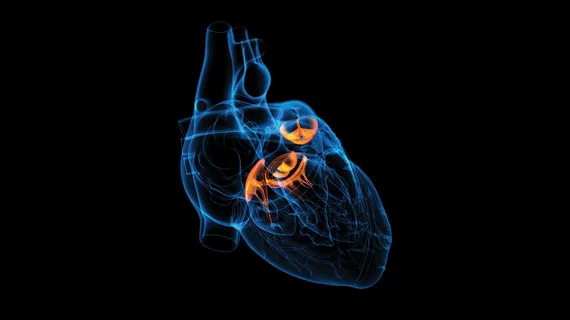AI-powered wearable predicts HF rehospitalizations 10 days ahead of time
A wearable sensor developed by researchers at University of Utah Health and VA Salt Lake City Health Care System has the potential to predict heart failure complications more than a week before they occur.
That’s according to a study published in Circulation: Heart Failure that explored the utility of an AI-powered sensor system in detecting future HF events. The study’s authors, led by Josef Stehlik, MD, MPH, of U of U Health, said heart failure is the number-one hospital discharge diagnosis in the U.S., and up to 30% of patients discharged with HF can expect to be readmitted to the hospital within three months of their index visit due to poor functional capacity, shortness of breath and fluid buildup.
“There’s a high risk for readmission in the 90 days after initial discharge,” Stehlik said in a statement. “If we can decrease this readmission rate through monitoring and early intervention, that’s a big advance. We’re hoping even in patients who might be readmitted that their stays are shorter, and the overall quality of their lives will be better with the help of this technology.”
The technology in question involves an adhesive sensor that patients place on their chests for continuous monitoring over time. ECG data collected from the sensor is transmitted via Bluetooth to a smartphone before it’s processed by an analytics platform that determines heart rate, heart rhythm, respiratory rate, walking, sleep, body posture and other activities. The analytics drew on AI to establish a “normal baseline” for each patient, and when their stats deviated from that norm, the sensor sent out a notification.
Stehlik et al. studied the approach in 100 heart failure patients who were diagnosed and treated at four VA hospitals in the U.S. Patients were fitted with the sensor upon discharge and wore it 24 hours a day for up to three months.
Overall, the authors reported, the system predicted an impending need for hospitalization more than 80% of the time. On average, the sensor would notify patients 10.4 days before a readmission took place.
“This study shows that we can accurately predict the likelihood of hospitalization for heart failure deterioration well before doctors and patients know that something is wrong,” Stehlik said. “Being able to readily detect changes in the heart sufficiently early will allow physicians to initiate prompt interventions that could prevent rehospitalization and stave off worsening heart failure.”

